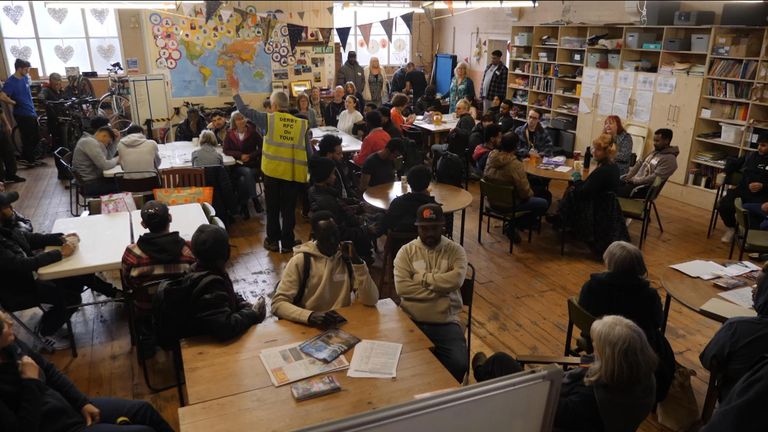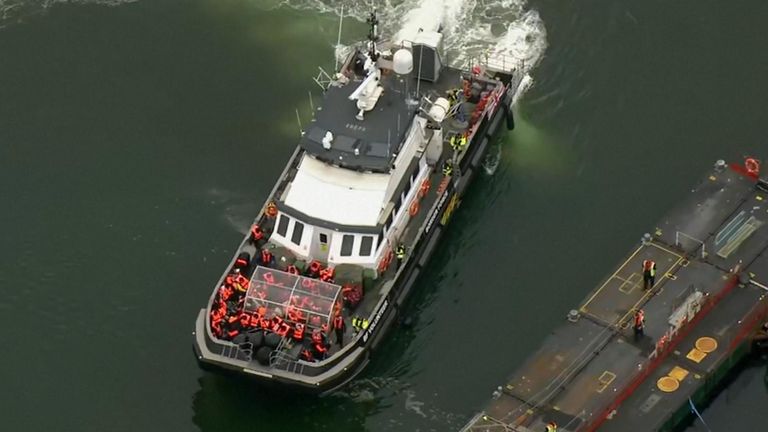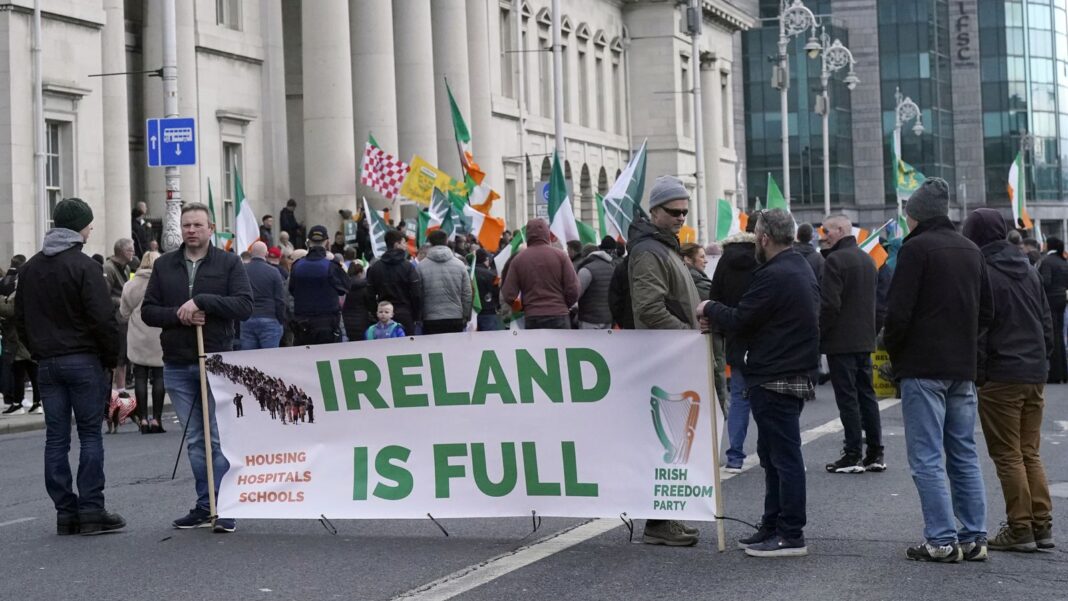Pepper spray flying, protestors shoved to the ground, flames leaping in the background as chants of “shame on you” filled the night air.
The scenes in Newtownmountkennedy in County Wicklow won’t have come as much of a surprise to many. It’s just the latest manifestation of a growing frustration with Ireland’s immigration policies.
The proposed refugee accommodation site has been a bubbling cauldron of resentment and anger for weeks now, often characterised by tense confrontations with Gardai officers.
Please use Chrome browser for a more accessible video player
0:50
Small boats challenge for French police
Like many of the protest sites we have visited, there is a mix of local residents – concerned about the sudden arrival of asylum seekers in their under-resourced rural location – and anti-immigration activists and “citizen journalists”, from Dublin and further afield.
The legacy media aren’t welcome at these sites. An RTE cameraman was run out of the Newtownmountkennedy protest. Even wearing a hoodie and jeans, and just holding a phone, I was asked immediately if I was police or media, before being told to “f*** off.”
The police are investigating a series of arson attacks at sites like this around the country, as the Irish government struggles to house the ever-increasing number of asylum seekers. It ran out of proper accommodation some time ago, which is why a tent city has sprung up around the international protection office on Dublin’s Mount Street.
The scores of tents – resembling Skid Row in the heart of Dublin’s Georgian Quarter – are where mostly male refugees camp, live, urinate and defecate. Charities try to help with sanitation and food. It’s become a focal point for protest. Videos of the tent city are circulated by anti-migrant campaigners.
The government cleared the tents and their unfortunate inhabitants out of the street ahead of the international spotlight of St Patrick’s Day. But it immediately sprang up again. When we visited on Thursday, it seemed larger than ever.
It feels like the system is being overwhelmed.
Why is it happening? Could the actions of Ireland’s closest neighbour be somewhat responsible?
Ireland’s Justice Minister Helen McEntee told a parliamentary committee this week that more than 80% of those applying for asylum in Dublin were estimated to have come over the border with Northern Ireland.
This content is provided by X, which may be using cookies and other technologies.
To show you this content, we need your permission to use cookies.
You can use the buttons below to amend your preferences to enable X cookies or to allow those cookies just once.
You can change your settings at any time via the Privacy Options.
Unfortunately we have been unable to verify if you have consented to X cookies.
To view this content you can use the button below to allow X cookies for this session only.
Six thousand people have applied for asylum in Ireland so far this year, so, using Ms McEntee’s estimate, 4,800 of those came from the UK.
We don’t know for sure because the border is unmonitored. Ironically, the same open, invisible border the Irish government fought so hard to maintain during Brexit could now be proving problematic when it comes to immigration.
Ireland’s deputy prime minister Micheal Martin has openly blamed the UK’s Rwanda policy, at least in part.
He said “fearful” people were trying “to get sanctuary here and within the European Union as opposed to the potential of being deported to Rwanda”.
Please use Chrome browser for a more accessible video player

4:53
Warning ‘don’t come to UK’
Just last month, the Irish High Court ruled that the designation of Britain as a “safe country” for returning refugees was unlawful and instead deemed it unsafe due to the risk of them being sent onward to Rwanda.
The “Ireland rules Britain unsafe” spin that resulted in parts of the UK media hinted at the diplomatic headache Dublin could now face.
It also means that it could now be illegal to send refugees back to Britain, another reason why refugees scared of being sent to Rwanda are tempted to jump on a ferry to Larne or Belfast and cross the invisible border.
The Irish government is quickly drafting legislation to try and navigate around the court’s ruling. But there is little doubt here that the Rwanda policy, which was passed on Tuesday, could be a driver behind a surge in asylum seekers coming to Ireland.
Read more:
Fighting and weapons on small boat, survivor says
Arrests after deaths of five people who tried to cross Channel
Migrants explain why they won’t be deterred by Rwanda bill
For the first time ever, immigration will be a hot issue in the upcoming general election in Ireland.
Ministers know this, and know they must make changes.
They’re hoping to persuade voters that signing up to the controversial new EU migration pact will help make Ireland firmer and fairer on immigration, even though it doesn’t kick in until 2026.
Please use Chrome browser for a more accessible video player

0:48
Migrants brought to shore in Dover
The new Taoiseach Simon Harris says new laws are also needed to deal with refugees who already have residency status in the UK.
He said on Thursday: “We need to have a process in place that if somebody has status in another country, in this case the United Kingdom, and comes here seeking asylum, they should be returned to Britain. And so there will be a need for legislative change here.”
Ms McEntee will meet with British Home Secretary James Cleverly next week to discuss the issue.
It seems unlikely the Conservatives will give an inch on their hard-fought Rwanda policy. The Irish are going to have to figure out how to deal with the fallout.
Meanwhile, many here fear the fires will continue to burn.







